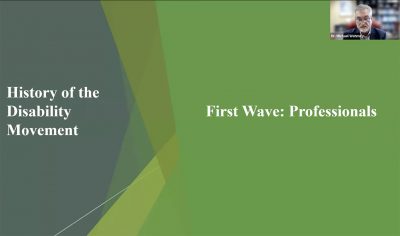Throughout history, people with intellectual and developmental disabilities have been misunderstood and mistreated, from legal sterilization to poor conditions at institutions. People with disabilities are able to achieve more than society has allowed them to, a guest lecturer presented earlier this week

Boston University’s Diversity and Inclusion Office hosted a discussion focusing on the history of the treatment of people with intellectual disabilities as a part of their Learn More Series on Oct. 12. The event — “History of Treatment of Individuals with Intellectual Disabilities with Dr. Michael Wehmeyer” — dived into Learn More’s topic for the year: disability.
BU Diversity and Inclusion hosted Michael Wehmeyer, chair of the University of Kansas’ department of special education, as the keynote speaker for the discussion. Oscar Hughes, a doctoral student in the Wheelock College of Education and Human Development, was the post-discussion leader. Wehmeyer discussed how disability has been perceived throughout history, which directly affects how people with disabilities are treated at that time.
“The work I’ve done is focused on promoting and enhancing the self-determination and inclusion of people, particularly with intellectual disability,” Wehmeyer said in an interview.
Karin Firoza, the Diversity and Inclusion Office’s director of special projects, introduced the event. She began her introduction by describing her appearance and background to make the event access to individuals with disabilities. An American Sign Language interpreter also translated the event. The rest of the presenters followed Firoza’s lead, describing their clothes and facial hair.
After his introduction, Wehmeyer discussed the evolution of the meaning, understanding and public perception of intellectual disability. He began by introducing the “gold standard” of how people with disabilities should be treated: the 2008 United Nations Convention on the Rights of Persons with Disabilities.
“The history of how people with intellectual disability have been understood and treated is not a very happy history,” Wehmeyer said in an interview. “Disability doesn’t make you somehow different from everyone else … It’s just another way of being a human.”
Wehmeyer then presented the historical context of the disability movement as three “waves.” The first wave covered professionals, and how they referred to disabled people in the past. This included offensive terms adopted from medicine, education and religion that marginalized these communities and furthered mistreatment.
Wehmeyer touched on the abusive facilities designed to keep people with intellectual and developmental disabilities out of common society. Many institutions participated in pseudoscience like eugenics to study and humiliate residents in the early 1900s.
These state institutions were overcrowded, resulting in poor conditions and sterilization of people with intellectual disabilities. Residents were mistreated and “viewed as incompetent” and “even as degenerates,” Wehmeyer said.
The second wave focused on parent organizations involved in the movement, and the third wave highlighted self-advocates. The Parent Movement was endorsed by President John F. Kennedy and created a community-based system of support for people with disabilities.
The goal of the presentation was to “move away from older ways of thinking about disability,” Wehmeyer said in an interview.
Hughes said in an interview that stereotypes represent people with disabilities as “not capable of having choice and control in their lives.” He also said he is currently doing a study to learn how to support LGBTQ+ individuals with intellectual and developmental disabilities.
“Families and supporters and teachers will assume that a person with an intellectual or developmental disability is not capable of having choice and control in their own lives,” Hughes said. “I’m interested in supporting people so that they can have agency and their life and choose things and control things so that they can make the life that they want for themselves.”
The discussion portion of the event encouraged attendee participation. Questions filtered through the webinar throughout Wehmeyer’s presentation and were read by Hughes after the presentation for Wehmeyer to weigh in.
He said during the lecture that “past is prologue” — referring to the phrase from William Shakespeare’s “The Tempest” — and that the past must be acknowledged so the future can change for people with intellectual disabilities.
“My objective is to both bring in awareness but also link that to how we move forward because what is past, is past,” he said. “There are ways we learn from that to move forward.”






















































































































